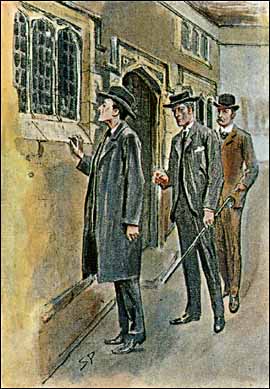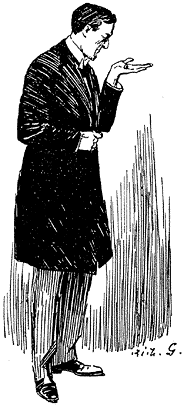| The Three Students 4 | The Three Students 5 |
The sitting-room of our client opened by a long, low, latticed window on to the ancient lichen-tinted court of the old college. A Gothic arched door led to a worn stone staircase. On the ground floor was the tutor’s room. Above were three students, one on each story. It was already twilight when we reached the scene of our problem. Holmes halted and looked earnestly at the window. Then he approached it, and, standing on tiptoe with his neck craned, he looked into the room.

“He must have entered through the door. There is no opening except the one pane,” said our learned guide.
“Dear me!” said Holmes, and he smiled in a singular way as he glanced at our companion. “Well, if there is nothing to be learned here, we had best go inside.”
The lecturer unlocked the outer door and ushered us into his room. We stood at the entrance while Holmes made an examination of the carpet.
“I am afraid there are no signs here,” said he. “One could hardly hope for any upon so dry a day. Your servant seems to have quite recovered. You left him in a chair, you say. Which chair?”
“By the window there.”
“I see. Near this little table. You can come in now. I have finished with the carpet. Let us take the little table first. Of course, what has happened is very clear. The man entered and took the papers, sheet by sheet, from the central table. He carried them over to the window table, because from there he could see if you came across the courtyard, and so could effect an escape.”
“As a matter of fact, he could not,” said Soames, “for I entered by the side door.”
“Ah, that’s good! Well, anyhow, that was in his mind. Let me see the three strips. No finger impressions – no! Well, he carried over this one first, and he copied it. How long would it take him to do that, using every possible contraction? A quarter of an hour, not less. Then he tossed it down and seized the next. He was in the midst of that when your return caused him to make a very hurried retreat – very hurried, since he had not time to replace the papers which would tell you that he had been there. You were not aware of any hurrying feet on the stair as you entered the outer door?”
“No, I can’t say I was.”
“Well, he wrote so furiously that he broke his pencil, and had, as you observe, to sharpen it again. This is of interest, Watson. The pencil was not an ordinary one. It was above the usual size, with a soft lead, the outer colour was dark blue, the maker’s name was printed in silver lettering, and the piece remaining is only about an inch and a half long. Look for such a pencil, Mr. Soames, and you have got your man. When I add that he possesses a large and very blunt knife, you have an additional aid.”
Mr. Soames was somewhat overwhelmed by this flood of information. “I can follow the other points,” said he, “but really, in this matter of the length– –”
Holmes held out a small chip with the letters NN and a space of clear wood after them.
“You see?”
“No, I fear that even now– –”
“Watson, I have always done you an injustice. There are others. What could this NN be? It is at the end of a word. You are aware that Johann Faber is the most common maker’s name. Is it not clear that there is just as much of the pencil left as usually follows the Johann?” He held the small table sideways to the electric light. “I was hoping that if the paper on which he wrote was thin, some trace of it might come through upon this polished surface. No, I see nothing. I don’t think there is anything more to be learned here. Now for the central table. This small pellet is, I presume, the black, doughy mass you spoke of. Roughly pyramidal in shape and hollowed out, I perceive. As you say, there appear to be grains of sawdust in it. Dear me, this is very interesting. And the cut – a positive tear, I see. It began with a thin scratch and ended in a jagged hole. I am much indebted to you for directing my attention to this case, Mr. Soames. Where does that door lead to?”
“To my bedroom.”
“Have you been in it since your adventure?”
“No, I came straight away for you.”
“I should like to have a glance round. What a charming, old-fashioned room! Perhaps you will kindly wait a minute, until I have examined the floor. No, I see nothing. What about this curtain? You hang your clothes behind it. If anyone were forced to conceal himself in this room he must do it there, since the bed is too low and the wardrobe too shallow. No one there, I suppose?”
As Holmes drew the curtain I was aware, from some little rigidity and alertness of his attitude, that he was prepared for an emergency. As a matter of fact, the drawn curtain disclosed nothing but three or four suits of clothes hanging from a line of pegs. Holmes turned away, and stooped suddenly to the floor.

“Halloa! What’s this?” said he.
It was a small pyramid of black, putty-like stuff, exactly like the one upon the table of the study. Holmes held it out on his open palm in the glare of the electric light.
“Your visitor seems to have left traces in your bedroom as well as in your sitting-room, Mr. Soames.”
“What could he have wanted there?”
“I think it is clear enough. You came back by an unexpected way, and so he had no warning until you were at the very door. What could he do? He caught up everything which would betray him, and he rushed into your bedroom to conceal himself.”
“Good gracious, Mr. Holmes, do you mean to tell me that, all the time I was talking to Bannister in this room, we had the man prisoner if we had only known it?”
“So I read it.”
“Surely there is another alternative, Mr. Holmes. I don’t know whether you observed my bedroom window?”
“Lattice-paned, lead framework, three separate windows, one swinging on hinge, and large enough to admit a man.”
“Exactly. And it looks out on an angle of the courtyard so as to be partly invisible. The man might have effected his entrance there, left traces as he passed through the bedroom, and finally, finding the door open, have escaped that way.”
Holmes shook his head impatiently.
“Let us be practical,” said he. “I understand you to say that there are three students who use this stair, and are in the habit of passing your door?”
“Yes, there are.”
“And they are all in for this examination?”
“Yes.”
“Have you any reason to suspect any one of them more than the others?”
Soames hesitated.
“It is a very delicate question,” said he. “One hardly likes to throw suspicion where there are no proofs.”
“Let us hear the suspicions. I will look after the proofs.”
“I will tell you, then, in a few words the character of the three men who inhabit these rooms. The lower of the three is Gilchrist, a fine scholar and athlete, plays in the Rugby team and the cricket team for the college, and got his Blue for the hurdles and the long jump. He is a fine, manly fellow. His father was the notorious Sir Jabez Gilchrist, who ruined himself on the turf. My scholar has been left very poor, but he is hard-working and industrious. He will do well.
“The second floor is inhabited by Daulat Ras, the Indian. He is a quiet, inscrutable fellow; as most of those Indians are. He is well up in his work, though his Greek is his weak subject. He is steady and methodical.
“The top floor belongs to Miles McLaren. He is a brilliant fellow when he chooses to work – one of the brightest intellects of the university; but he is wayward, dissipated, and unprincipled. He was nearly expelled over a card scandal in his first year. He has been idling all this term, and he must look forward with dread to the examination.”
“Then it is he whom you suspect?”
“I dare not go so far as that. But, of the three, he is perhaps the least unlikely.”
“Exactly. Now, Mr. Soames, let us have a look at your servant, Bannister.”
| The Three Students 4 | The Three Students 5 |